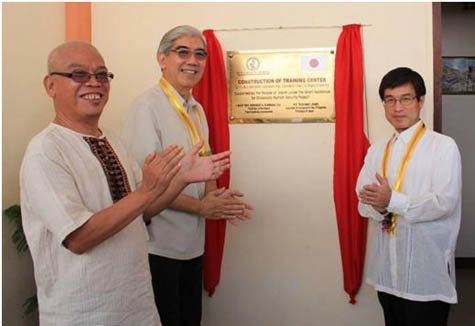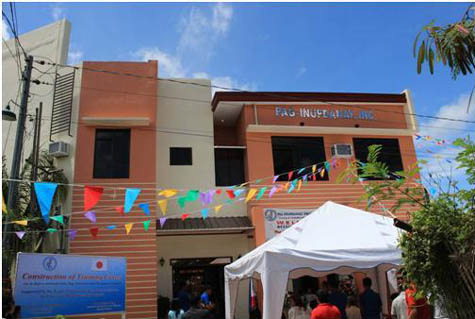
Minister for Economic Affairs Akio Isomata of the Embassy of Japan (right) together with Mayor Jose L. Montelibano of Silay City (middle) and Mr. Teodorico Peña, Executive Director of Pag-Inupdanay, Inc. (left) led the unveiling of building marker during the inauguration of the Vocational Training Center in Negros Occidental on March 29, 2012.

Photo shows the newly-completed Vocational Training Center in Silay City funded by the Japanese Government under the Grant Assistance for Grassroots Human Security Projects (GGP). The center is expected to benefit around 500 women and children from Sipalay City, and Municipalities of Candoni and Toboso.
Minister for Economic Affairs, Akio Isomata , of the Embassy of Japan attended the turnover ceremony of “ The Project for the Construction of Vocational Training Center in Negros Occidental” on 29 March 2012. Silay City Mayor Jose L. Montelibanoand Mr. Teodorico Peña, Pag-Inupdanay Inc. Executive Director, also witnessed the ceremony. The project, amounting to US$ 95,331 (approximately 4.1 million pesos), is funded through the Grant Assistance for Grassroots Human Security Projects (GGP).
Negros Island is often referred to as the sugar capital of the Philippines where around 60% of the sugar supply of the country emanates. With a monthly income of about PhP 1,500-3,000, many farmers in the island, including their family members, work for huge sugarcane plantations due to the delay in the implementation of agrarian reform program of the government. Children and youth up to 18 years old are often engaged in hazardous and exploitative works such as carrying canes and applying fertilizers, which have been described as one of the worst forms of child labor by the International Labor Organization (ILO). Currently, around 140,000 minors are said to work under the severe conditions such as small amount of income and long time work.
Since 2003, Pag-Inupdanay Inc., an NGO based in Bacolod City, has been actively involved in bringing positive change to the lives of marginalized women and children workers through the implementation of their poverty reduction programs. It has partnered with other non-government organizations (NGOs) as well as government institutions such as the Technical Education and Skills Development Authority (TESDA) in providing education and job skills trainings. However, the lack of their own training facilities and the increasing demand from women and children workers for trainings have made it more and more difficult to provide adequate training.
Under these circumstances, Pag-Inupdanay Inc. sought the assistance from the Embassy of Japan to construct a vocational training center in Silay City. The center has eight training rooms with necessary training equipment that can each accommodate 20 trainees at once. In addition, there is a dormitory in the center for trainees from remote areas that can accommodate 30 persons. This center will provide vocational trainings related to various fields such as food processing, welding, carpentry, dressmaking, and computer literacy that will help women and children venture into other livelihood activities other than work in the sugar plantations. The center is expected to benefit around 500 women and children from Sipalay City, and Municipalities of Candoni and Toboso.
In his speech, Minister Isomata said, “Projects epitomized by this center are an important contribution towards achieving human security that is one of the pillars of Japanese diplomacy. It is Japan’s priority to empower and improve the situation of every individual, especially marginalized women and children under the concept of human security.”
Japan, as the top donor of the official development assistance for the Philippines, launched GGP in the Philippines in 1989 for the purpose of reducing poverty and helping various communities engaged in grassroots activities. GGP also contributes to the ensuring of “human security,” which is one of the major pillars of Japan's diplomacy and aims to empower vulnerable people to protect themselves from various threats. As of March 2012, 468 grassroots projects funded by GGP – ranging from roughly 1 to 4 million pesos – have been implemented by NGOs, local government units and other non-profit organizations. The total grant for these projects so far amounts to US$22,499,005. Japan believes that this project will strengthen not only the friendship between the peoples of Japan and the Philippines but also the existing strategic partnership between Japan and the Philippines.
Japanese Version



